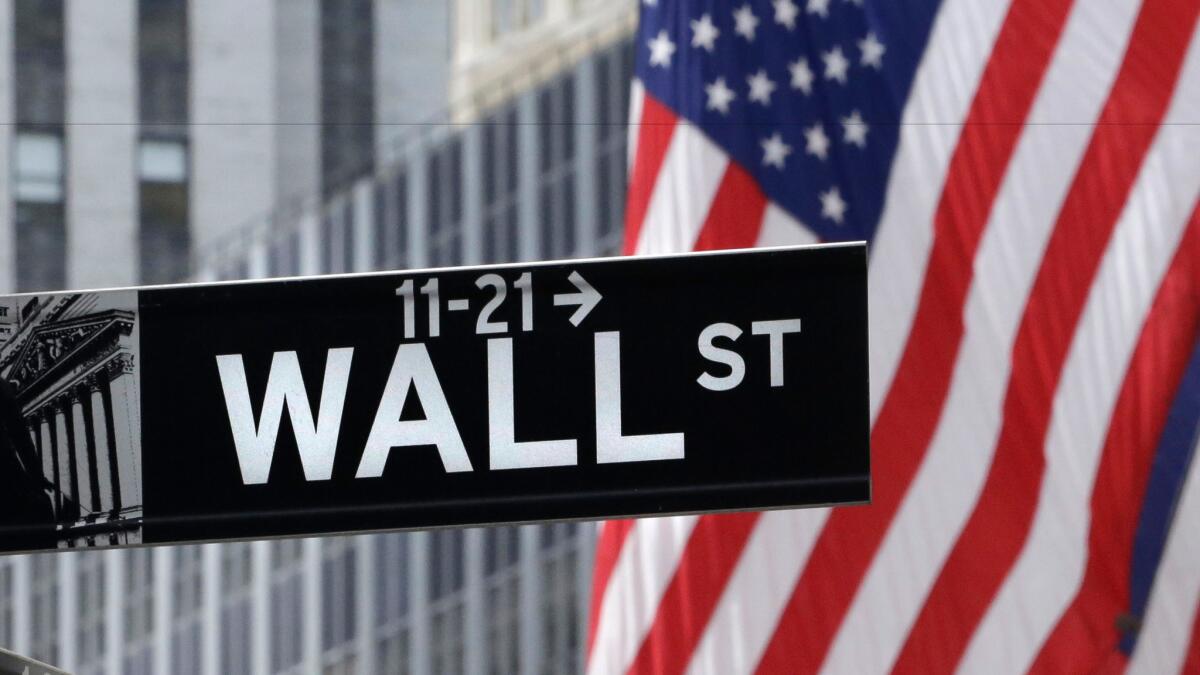Stocks soar, posting their biggest gains since the presidential election

- Share via
The Dow Jones industrial average and Standard & Poor’s 500 indexes soared Wednesday to their biggest gains since the presidential election and set all-time highs. Investors bought stocks that do well in times of faster economic growth, such as technology and industrial companies, but they also snapped up stocks that pay large dividends.
Stocks moved steadily higher throughout the day after a mixed open. Phone and real estate companies made the largest gains, but the rally moved into high gear in the afternoon as airlines, railroads and trucking companies soared.
Investors took the rally in transportation stocks as a sign of optimism about economic growth. Technology and consumer-focused companies also jumped. Biotech drug companies took steep losses after President-elect Donald Trump said he wants to reduce drug prices.
The transportation sector reached an all-time high for the first time in two years. Julian Emanuel, an equity strategist for UBS, said investors see the record as a sign that businesses will start spending more, which would bolster economic growth.
“The consumer has really been the engine of the economy,” he said. “The missing piece has been the corporate side, the industrial side.”
The Dow jumped 297.84 points, or 1.5%, to 19,549.62. The S&P rose 29.12 points, or 1.3%, to 2,241.35. The Nasdaq composite recovered from an early loss to close up 60.76 points, or 1.1%, to 5,393.76 — about five points short of its all-time high.
The Russell 2000 index of small-company stocks also recovered from an early loss and set its own a record as it advanced 11.84 points, or 0.9%, to 1,364.51.
U.S. government bond prices rose, sending yields lower. The yield on the 10-year Treasury note fell to 2.34% from 2.39%. Bond yields have risen sharply since the summer but have slipped in the last few days.
The lower bond yields have helped stocks that are seen as bond substitutes, such as real estate investment trusts. Their big dividends are attractive to investors who want income, so when bond yields fall, investors often turn to those stocks. Industrial real estate company Prologis rose 3.2% to $52.32. Verizon went up 2% to $51.38.
AT&T jumped 2.8% to $40.45 as a Senate antitrust panel scrutinized its planned $85.4-billion purchase of Time Warner, the parent of HBO. Legislators asked if the deal would improve competition and reduce prices for consumers, as the companies say it will. Time Warner shares edged up 8 cents to $93.98.
A wide array of companies that stand to benefit from faster economic growth also climbed. Home improvement retailer Lowe’s jumped 5.4% to $76.40 and truck maker Paccar rose 5% to $67.63. U.S. Steel advanced 4.3% to $37.49.
IBM led technology companies higher, rising 2.8% to $164.79. Hard drive maker Western Digital climbed 8.3% to $69.15 after it extended a patent licensing deal with Samsung.
In an interview with Time magazine published Wednesday, the president-elect said he wants to reduce drug prices. He did not say how his administration plans to do that. Democratic nominee Hillary Clinton campaigned on reducing drug prices, and drug company stocks had rallied since the election as investors felt that was less likely to happen under Trump.
After the Time interview came out, the Nasdaq biotechnology index, populated by companies that make costly medications and could lose the most under tighter price regulations, tumbled 2.9%. Amgen fell 2.7% to $141.19 and Vertex Pharmaceuticals slid 3.6% to $75.32.
Abbott Laboratories moved to terminate its purchase of diagnostic test maker Alere. Abbott agreed to buy Alere in February for about $5.8 billion, or $56 a share. But since then, Alere has recalled a key monitoring device and delayed a financial statement, and it’s being investigated over its overseas business. Alere said Abbott’s lawsuit is without merit.
Alere stock dropped 8% to $36.67. Abbott stock edged up 6 cents to $38.48.
Benchmark U.S. crude oil slid 2.3% to $49.77 a barrel. Brent crude, the international standard, fell 1.7%, to $53 a barrel. Energy companies traded higher Wednesday, although they rose less than the rest of the market.
European stock indexes jumped as investors anticipated that the European Central Bank will extend its bond-buying stimulus program Thursday. The stimulus is designed to boost growth and inflation. European stock indexes climbed. Germany’s DAX gained 2% and the FTSE 100 in Britain rose 1.8%. The CAC 40 of France picked up 1.4%.
The dollar fell to 113.85 yen from 114.05 yen. The euro rose to $1.0759 from $1.0715.
Wholesale gasoline fell 3 cents to $1.51 per gallon. Heating oil fell 2 cents to $1.62 a gallon. Natural gas fell 3 cents to $3.60 per 1,000 cubic feet.
Gold rose $7.40 to $1,177.50 an ounce. Silver rose 47 cents to $17.28 an ounce. Copper fell 4 cents to $2.64 a pound.
Japan’s benchmark Nikkei 225 rose 0.7% and the South Korean Kospi inched up 0.1%. The Hang Seng in Hong Kong gained 0.5%.
UPDATES:
3:05 p.m.: This article was updated with closing prices, analyst comments and additional information.
1:25 p.m.: This article was updated with the close of markets
11:10 a.m.: This article was updated with market prices, additional details and context.
This article was originally published at 7 a.m.
More to Read
Inside the business of entertainment
The Wide Shot brings you news, analysis and insights on everything from streaming wars to production — and what it all means for the future.
You may occasionally receive promotional content from the Los Angeles Times.










